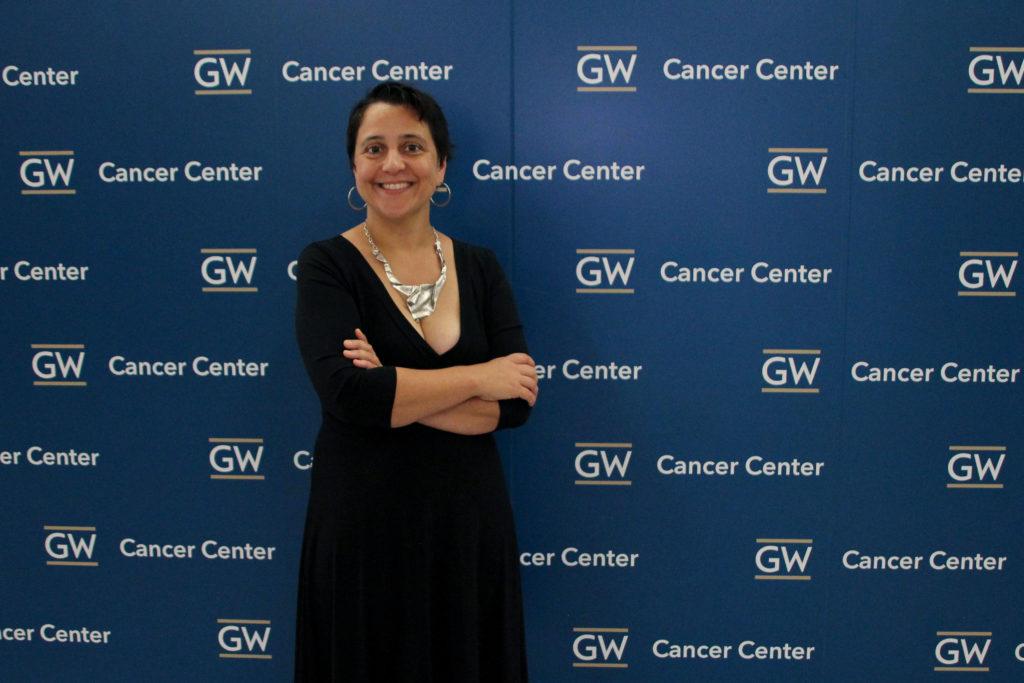Updated: Sept. 20, 2018 at 12:15 p.m.
Researchers and physicians in the GW Cancer Center are targeting health issues that hit close to home.
As the center sets its sights on becoming a nationally recognized research hub, officials said researchers and physicians will focus on becoming experts in LGBTQ health equity and liver cancer – health problems that officials said are frequently diagnosed in D.C. but are highly under-researched.
Mandi Pratt-Chapman, the associate center director of patient-centered initiatives and health equity at the Cancer Center, said the center received funding to evaluate the impact of smoke-free public housing in D.C. and is involved in several initiatives related to tobacco control. She said members of the Cancer Center are also involved in projects that focus on obesity-related cancer prevention and LGBTQ-, black- and Hispanic-specific health issues.
She added that findings on D.C.-specific health research will be available in the coming year.
“The GW Cancer Center is committed to research relevant to the D.C. area,” Pratt-Chapman said in an email. “There is currently work ongoing to investigate how policy changes at the local level have influenced cancer care for patients reliant on Medicaid in Washington, D.C.”
Pratt-Chapman said the center participated in a workshop in July that 62 D.C. community members attended to discuss health and research priorities for the LGBTQ community. She said D.C. is home to the largest per capita percentage of sexual and gender minorities in the country.
About 11 percent of the District identifies as LGBTQ, according to data collected by the Williams Institute at the University of California, Los Angeles School of Law.
She added that a symposium is planned for Nov. 17 to discuss LGBTQ health care needs within the D.C. community.
Pratt-Chapman said the center hopes that by raising awareness about LGBTQ health concerns, “scientists across the University will contribute to solutions.” She said investigators are seeking “highly competitive” funding from the National Cancer Institute to focus on breast cancer screening experiences for transgender patients.
She added that the Cancer Center published a fact sheet for transgender patients who are diagnosed with prostate cancer, including a guide and training information for sexual and gender minority prostate cancer survivors.
Researchers in the Cancer Center also hope to focus on liver cancer among the Ethiopian population in the District, which has one of the highest rates in the country, she said. The Cancer Center also plans to invest in a pilot project that will investigate possible methods of mitigating liver cancer for Ethiopian patients.
In the GW Liver and Pancreas Institute for Quality, researchers are investigating gene mutations and the regulation of gene expression that could lead to new therapeutic treatments for liver cancer patients, Pratt-Chapman said.
“We will be looking for approaches to understand and address this trend,” she said.
Eduardo Sotomayor, the director of the Cancer Center, said in an interview last month that researchers in the Cancer Center are working to become “experts” in areas like cancer care for LGBTQ patients because researchers currently don’t know the full impact of breast cancer and prostate cancer for transgender patients.
He said while other schools, like Georgetown and Johns Hopkins universities, have started to look into this area of research – GW was the first.
“Georgetown now is doing work in that area, Hopkins now is doing work in that area, but we’re ahead,” he said.
Harold Frazier, a professor of urology and the director of urologic oncology for the Cancer Center, said physicians are focused on improving awareness and outreach for members of the LGBTQ population who may not normally have the resources to be screened or treated for prostate cancer.
Frazier said the District has one of the highest death rates from prostate cancer per capita, with more than 80 residents dying from the disease each year.
“We have a large transgender population that has developed over the years, and today a lot of them don’t come forward for health care, because historically they’re not always treated fairly or equally, and our goal would be that they are provided care on an equitable basis,” Frazier said.
Frazier said the Cancer Center employs social workers and patient navigators that specifically work to ensure LGBTQ patients have the health care options they need through the center, and will check in on patients if they don’t show up for an appointment.
“I work with a navigator in prostate cancer who is very good at getting the patients to come in and making sure that they don’t fall through the cracks,” Frazier said. “Sometimes they’re afraid, and they don’t have the social network to help them through that process.”
Martin Ojong-Ntui, an assistant professor of radiology who has worked with physicians at the center for 16 years, said he is optimistic that the center’s push to treat D.C.-specific health issues will help it become an NCI-designated cancer center.
“I think focusing on those issues will reassure the NCI that we have the resources needed to address the needs of patients with cancer in the District,” Ojong-Ntui said.
Leah Potter contributed reporting.
This post was updated to reflect the following correction:
The Hatchet incorrectly listed Mandi Pratt-Chapman’s title. It is now correct. We regret this error.





